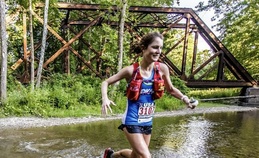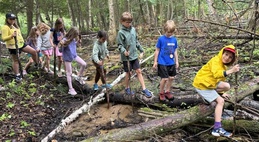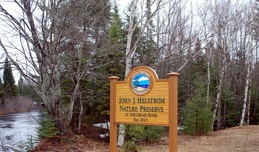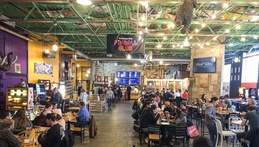
Room for Improvement (and Collaboration)
What members of the blind and visually impaired community have to say about accessibility in Traverse City
By Art Bukowski | March 2, 2024
Sometimes Roxane Townsend will feel bold enough to cross Grandview Parkway for a chance to sit by the bay and listen to the waves.
Townsend, 68, is fully blind now, but it wasn’t always that way. She remembers those deep, vivid blues set against the lighter hues of a summer sky. When she sits on the sand and hears the waves lapping the shore, it isn’t hard to conjure up what many of us take for granted.
“I know what the bay looks like; I can imagine it in my head whenever I want,” she says. “A lot of people don’t realize they have this vision in their brain until something like this happens.”
Townsend lives in a small room in an old house on Second Street, which is quite close to that big blue bay. But for someone who can’t see, it can feel 100 miles away. She doesn’t know if it’s day or night without her phone speaking and telling her the time, she says, and previously simple tasks can now be mountains to climb.
“I get up most days and try to find myself. I have to find my clothes, find my toothbrush, find my shoes—my goodness. Take off your shoes, put them someplace, then close your eyes and try to find them,” she says. “I want everybody to try that. Just the shoes.”
Townsend says she has adult children to help her and a cab driver she’s made friends with, and in the past, she’s made use of BATA buses. This means karaoke at the Sail Inn and visits to the library, among other places.
“Music has always been in my family and in my mind,” she says. “It’s my mainstay.”
And she’s often out and about with “Matilda,” her trusty cane. It’s a bit bulkier than the common slender white canes, but she wouldn’t trade it for anything.
“I keep changing the ends on her. She’s stoked fires and lots of other stuff,” Townsend says. “She’s been through it all with me.”
And while Townsend makes the most of things, she can’t shake the feeling that she is at once a burden on society and invisible to those around her.
“A lot of blind people are embarrassed. We are mortified…there is such a stigma attached to it,” she says. “We are made to feel less than other people.”
Identifying Progress and Problems
Townsend has not been impressed with the services for people who are blind in the Traverse City area. She cites issues with transportation, few safe crosswalks, and a general lack of awareness.
“I feel like there’s not a lot of help for blind people north of Grand Rapids,” she says. “Sometimes I feel like I’m in the dark ages.”
Disability advocates in the Traverse City area say the region gets mixed grades when it comes to supporting those with visual impairments.
The exact number of people with visual impairments in the region is hard to pin down due to incomplete surveying combined with different definitions of impairment, advocates say. But it’s estimated that hundreds of people in the Grand Traverse region and thousands across northern Michigan at large have at least some degree of significant visual impairment.
Demarie Jones is an independent living resource specialist with Disability Network Northern Michigan, which assists people with all forms of disabilities across the northern portion of the state. There are state and federal agencies that provide help, too, Jones says, but they are stretched pretty thin. The state-run Bureau of Services for Blind Persons (BSBP) is one such agency.
“Like every agency, the BSBP is strapped for employees, so there are basically two individuals that serve the entire upper part of Michigan,” Jones says.
Disability Network offers direct assistance to people with visual impairments, largely by helping with day-to-day life tasks and other needs as necessary. On a community-wide level, the group presses local government to continuously improve accessibility.
“We’re making progress. In the case of crosswalks, when roads are being changed or new lights being put up, they’re adding an auditory signal,” she explains. “We don’t get much pushback when it comes to making things more accessible.”
Other positives include increasing recreational opportunities in the form of universally accessible trails, Jones says. The Grand Traverse Regional Land Conservancy is among the organizations working to provide such opportunities at its preserves and natural areas.
“Which is good, because that’s why we all live up here, right?” Jones says. “To enjoy the beauty of nature.”
Where the community continues to fail, she notes, is in finding safe and affordable places for people with disabilities to live.
“Where we’re stumbling is housing. It’s a huge, huge problem for folks who are disabled, or elderly, or on a low income,” she says. “We’re building all kinds of housing, and only a small portion of it is allocated for people on fixed income. That’s where we’re falling way behind.”
Working Together for a Better Future
Melinda Hollands, a social worker, is also blind. She runs a support and networking group called Traverse City Visually Impaired Persons, or TC-VIP. About a dozen people come together each month, though about 70 people are on the email list.
In addition to transportation and housing, Hollands says employment for people who are blind or visually impaired is another significant issue throughout the region.
“People who are visually impaired have a lot of skills and a lot to offer employers. But a lot of times they don’t get that opportunity to work because there’s so many assumptions about what people can or cannot do, or how safe they may or may not be,” she says. “Employment is a big barrier for people.”
Hollands has been mulling over the idea of a disability etiquette presentation that could be provided to groups throughout the community to help the general public interact with people who are blind.
“They’re often intimidated, maybe even scared and unsure [when interacting with us],” she says. “And we as the blind community don’t want to be scary. We don’t want to intimidate people. People mean well…so we can continue to raise awareness and educate people. It could be a win-win situation.”
Moving forward, the TC-VIP group, Disability Network, and other advocates hope for a seat at the table—or at least to be consulted—as community decisions are made.
“We’re not experts in road design, but the people who are experts in road design may have no clue what it’s like to be visually impaired,” Hollands says. “We’re trying to work together, and that can be really positive.”
Pictured: Steve Lagerquist of the Grand Traverse Regional Land Conservancy leads a hike for people with visual impairments and other disabilities at GTRLC’s Arcadia Dunes preserve. The conservancy gathered input from people with visual impairments while designing a universal access trail there.
Trending

A Week of Inspirational Speakers at the Ramsdell
Sabrina Little shines the light on how sports can shape character as part of the January Series at The Ramsdell Regional Cen… Read More >>
Ready, Set, Camp! Northern Michigan's 2026 Summer Camps
Yes, it’s January, but many summer camp registrations are now open or will soon be available. Below, we’ll share… Read More >>
LTC Announces Record-Breaking Conservation Year
Earlier this month, the Little Traverse Conservancy made a big announcement: 2025 was their best conservation year ever in t… Read More >>


